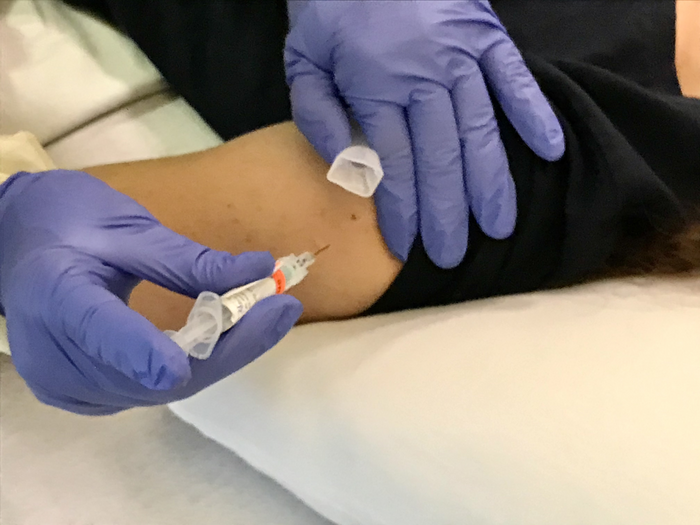A Phase 1 clinical trial of a novel influenza vaccine has begun inoculating healthy adult volunteers at the National Institutes of Health Clinical Center in Bethesda, Maryland. The placebo-controlled trial will test the safety of a candidate vaccine, BPL-1357, and its ability to prompt immune responses. The vaccine candidate was developed by researchers at the National Institute of Allergy and Infectious Diseases (NIAID). The single-site trial can enroll up to 100 people aged 18 to 55 years and is led by NIAID investigator Matthew J. Memoli, M.D.

Credit: NIAID
A Phase 1 clinical trial of a novel influenza vaccine has begun inoculating healthy adult volunteers at the National Institutes of Health Clinical Center in Bethesda, Maryland. The placebo-controlled trial will test the safety of a candidate vaccine, BPL-1357, and its ability to prompt immune responses. The vaccine candidate was developed by researchers at the National Institute of Allergy and Infectious Diseases (NIAID). The single-site trial can enroll up to 100 people aged 18 to 55 years and is led by NIAID investigator Matthew J. Memoli, M.D.
“Influenza vaccines that can provide long-lasting protection against a wide range of seasonal influenza viruses as well as those with pandemic potential would be invaluable public health tools,” said NIAID Director Anthony S. Fauci, M.D. “The scientific community is making progress on this pressing global health priority. The BPL-1357 candidate influenza vaccine being tested in this clinical trial performed very well in pre-clinical studies and we look forward to learning how it performs in people.”
BPL-1357 is a whole-virus vaccine made up of four strains of non-infectious, chemically inactivated, low-pathogenicity avian flu virus. A study in animals, led by NIAID investigator Jeffery K. Taubenberger, M.D., Ph.D., and posted online as a pre-print, found that all mice receiving two doses of BPL-1357 vaccine delivered either intramuscularly or intranasally survived later exposure to lethal doses of each of six different influenza virus strains, including subtypes that were not included in the vaccine. Similar results were obtained in challenge experiments with BPL-1357-vaccinated ferrets.
In the Phase 1 trial, volunteers will be randomized in a 1:1:1 ratio into three groups and will receive two doses of placebo or vaccine spaced 28 days apart. Group A participants receive BPL-1357 intramuscularly along with intranasal saline placebo; Group B will receive doses of the candidate vaccine intranasally along with intramuscular placebo; volunteers in Group C receive intramuscularly and intranasally delivered placebo at both visits to the clinic. Neither the study clinicians nor the volunteers know the group assignments. Volunteers must not have received any type of flu vaccination in the eight weeks prior to enrollment and must agree to forego seasonal flu vaccination for approximately two months after the second vaccine (or placebo) dose.
The study duration for each participant is approximately seven months. In addition to the two clinic visits to receive vaccine (or placebo), volunteers will be asked to return to the clinic seven times to provide blood and nasal mucosal samples that will be used by the investigators to detect and characterize immune responses.
“With the BPL-1357 vaccine, especially when given intranasally, we are attempting to induce a comprehensive immune response that closely mimics immunity gained following a natural influenza infection,” said Dr. Memoli. “This is very different than nearly all other vaccines for influenza or other respiratory viruses, which focus on inducing immunity to a single viral antigen and often do not induce mucosal immunity.”
“Our study will examine the safety of BPL-1357 and also will allow us to assess the importance of mucosal immunity against flu and whether a strategy of inducing both the cellular and antibody arms of the immune system can provide broader protection against the ever-changing influenza virus,” he added.
For additional information about the trial, visit ClinicalTrials.gov and search on the trial identifier NCT05027932.
NIAID conducts and supports research—at NIH, throughout the United States, and worldwide—to study the causes of infectious and immune-mediated diseases, and to develop better means of preventing, diagnosing and treating these illnesses. News releases, fact sheets and other NIAID-related materials are available on the NIAID website.
About the National Institutes of Health (NIH): NIH, the nation’s medical research agency, includes 27 Institutes and Centers and is a component of the U.S. Department of Health and Human Services. NIH is the primary federal agency conducting and supporting basic, clinical, and translational medical research, and is investigating the causes, treatments, and cures for both common and rare diseases. For more information about NIH and its programs, visit www.nih.gov.
NIH…Turning Discovery Into Health®




